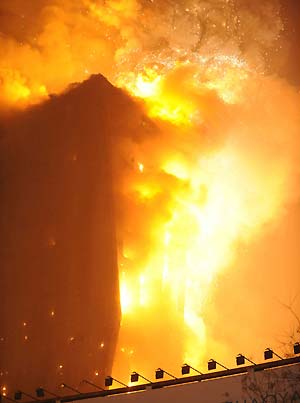|

|
|
The photo taken on Feb. 9, 2009 shows the ablaze north wing building of the new CCTV (China Central Television) headquarters in Beijing, capital of China. A fire broke out on Monday night at the building, namely Mandarin Oriental Hotel, which is about hundreds of meters away from the new CCTV main tower in east Beijing. [Xinhua/Li Wen] |
Tens of thousands of Chinese citizens are fiercely debating online whether Beijing should reverse recent ease up on fireworks ban during the Spring Festival just hours after a firecracker caused a new CCTV building to go up in flames Monday night.
Nearly 70 percent of the surveyed people supported the re-adoption of the ban, while 18 percent opposed, China News Service reported Wednesday, quoting figures from a leading Beijing-based website.
A supportive citizen from Beijing said the danger of fireworks will obviously increase in a densely populated city like Beijing and the fumes generating from the firework explosions will cause air pollution, while a Shandong native called on the people to seek a safe way to celebrate.
However, the opposite side suggested the government not impose the ban again, worrying the firework-free festival will spoil the festive atmosphere and hamper the firework tradition during the festival that has been popular in the country for hundreds of years.
The Monday's blaze started around 8:30 pm at the Mandarin Oriental Hotel on the north wing of the new CCTV headquarters complex, turning the sky over the central business district (CBD) a crimson red. The sky over the capital was already aglow with fireworks celebrating the Chinese Lantern Festival and the last day of the Chinese Lunar New Year holidays.
Latest reports say the fire was caused by the setting-off of an illegal type of dangerous fireworks in front of the tall building, which in fact got permission from CCTV. The building was yet to be completed before the fire and obviously lack of fire-extinguishing equipment.
One fire fighter died in the rescue after inhaling excessive toxic fumes and seven others, including six firemen and a worker in the building were injured.
The air quality in the city also plunged to a heavy pollution level Tuesday, the worst this year, as a result of the firework celebrations on Monday night.
Since January 25, the eve of the new lunar year, 403 people have been injured and 103 fire incidents have been reported.
Beijing implemented a bill to ban fireworks in urban areas during the Spring Festival in 1993. It was amended in 2006 to allow people to light up fireworks at designated places and within a limited time period during the Lunar New Year holidays.
(CRI February 11, 2009)